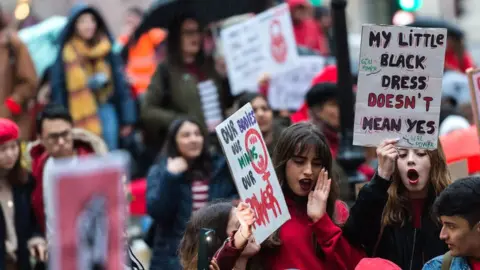Rape victims still being 'failed' two years after action promised
 Getty Images
Getty ImagesTwo years after the government's end-to-end rape review for England and Wales, victims are still being failed, say women's groups.
Charge rates are low, support services underfunded and, in court, cases face lengthy backlogs, says their report.
The review promised to put more rapists behind bars but "we have barely scratched the surface", says the End Violence Against Women Coalition.
The government said it was on track to meet the rape review ambitions.
The Centre for Women's Justice, End Violence Against Women Coalition, Rape Crisis England and Wales, and black feminist organisation Imkaan produced the report to coincide with the second anniversary of the government's rape review.
The 2021 review came as women's groups said rape had been effectively decriminalised after prosecutions in England and Wales dropped to a record low.
The review pledged to:
- return the volume of cases going to trial to 2016 levels
- reduce the number of victims withdrawing from the process
Two years on, women's groups acknowledge some "green shoots" of positive change, including:
- the setting up of a 24/7 support line
- moves towards specialist rape courts
- police returning complainants' phones sooner
However, the latest available Home Office figures show that between April and December 2022 there were about 50,000 rape offences recorded by police in England and Wales.
Of these offences, about 900, amounting to fewer than 2%, have so far resulted in a charge or court summons.
Of the bulk of the cases, more than 20,000 are still being investigated - while another 20,000 have had to close because the victim has withdrawn from legal proceedings.
"After two years of promises and commitments we have barely scratched the surface to improve support for victims of rape, let alone preventing it in the first place," said Andrea Simon, director of the End Violence Against Women Coalition
Harriet Wistrich, director of the Centre for Women's Justice, says while there has been some improvement to charging levels, they are nowhere near those before 2016, "meaning only a small minority of those who report rape will see their cases prosecuted".
She says the key problem now lies with a failure of police to refer cases to the Crown Prosecution Service or get early advice.
"Those that report rape are still facing disproportionate requests for personal data which impacts directly on the attrition rate," adds Ms Wistrich.
'Disappointing'
Imkaan, which focuses on violence against black and minoritised women and girls, says: "It is well established that race and ethnicity remain one of the very biggest gaps in police data.
"It is disappointing that there has been no progress in understanding who does and does not access the criminal justice system."
A number of police forces in England and Wales have adopted Operation Soteria, a Home Office scheme to increase prosecutions, to investigate rape and serious sexual offences.
The women's groups claim Soteria's progress is threatened by uncertainty over future funding.
"The pace of change must pick up. Victims and survivors of these highly traumatic crimes deserve justice now," says Amelia Handy, head of policy and public affairs at Rape Crisis England and Wales.
A government official said: "We're doing more than ever to ensure rape victims get better support and quicker justice and we remain on track to meet the ambitious targets set out in our rape review two years ago... but we know more needs to be done for victims to come forward and stick with the process."
The changes being made included better funding for support services and enabling victims to pre-record their evidence to court, the official added.
